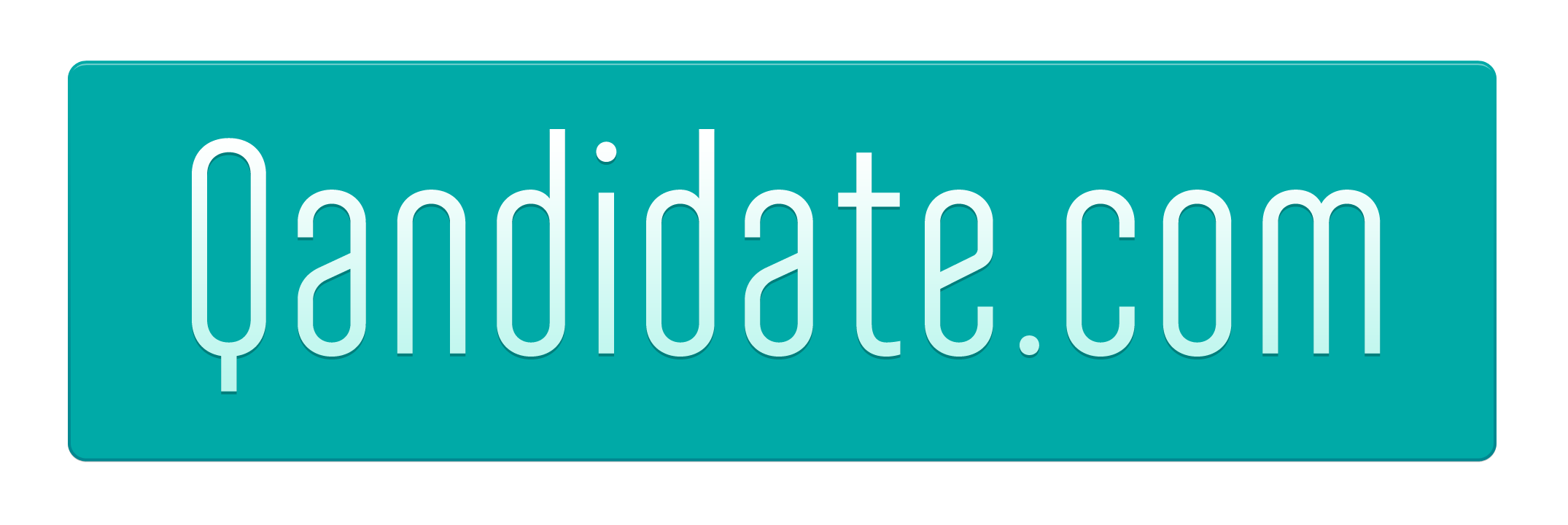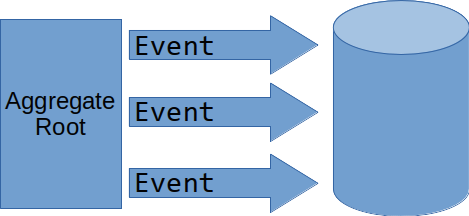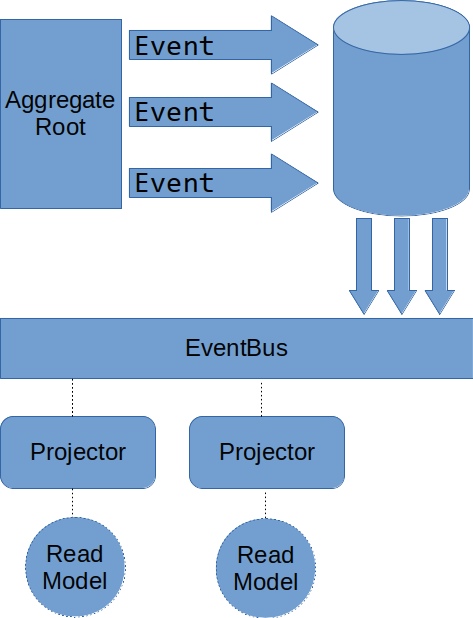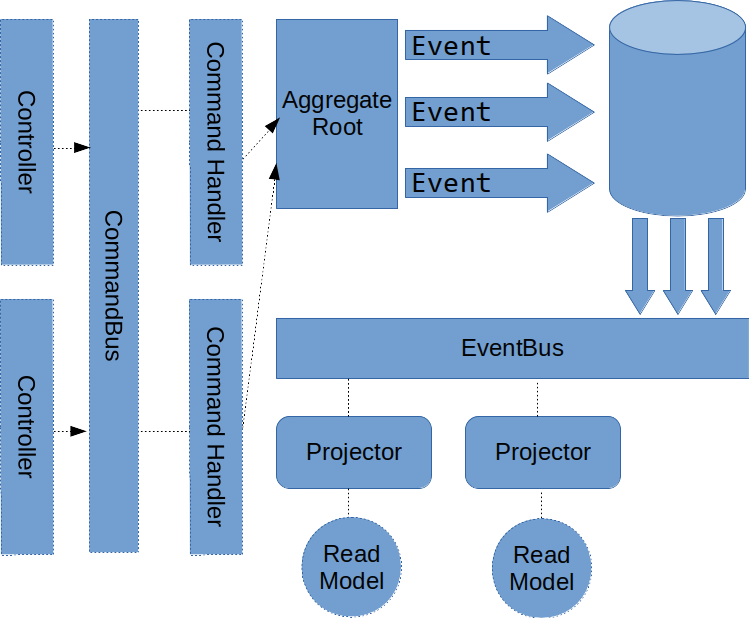
Event Sourcing
Let's write some history
https://joind.in/talk/3375d
Willem-Jan Zijderveld
- @willemjanz
- github.com/wjzijderveld


Rotterdam
http://labs.qandidate.com
Broadway
Event Sourcing/CQRS
library for PHP
github.com/qandidate-labs/broadway
Event Sourcing
You are throwing away data!

Only state gets stored
Only the most recent state gets stored
What was the previous state?
Why did the state change?
It's hard to keep track of all the data
An example
A company has one or more connected accounts
A company has one or more enabled applications
An account has access to one or more applications

Complicated solutions to store and retrieve the data
But we manage
Until...
Boss: Which accounts received access to application X in December?
"We'll add a timestamp
and we will know"
From that point in time
With CRUD you lose information
You only store the last known information
Another example
Revoking access to an application for an account
Just remove the row in our join table
You lose when the access was revoked
You lose why it got revoked
You lose for which application it was revoked
You wouldn't know anything anymore
Let's assume you have
a soft-delete in place
Boss: I want to know for which applications access got revoked more than once
in the last year
Keep track of revocations
| account_id | app_id | datetime |
|---|---|---|
| 75623 | 8 | 2015-01-01T00:00:00+0000 |
| 75623 | 8 | 2015-01-27T18:54:18+0000 |
Are you going to do this for all actions on accounts?
How does Event Sourcing help me with that?
Store your data in
a different way
Record what has happened
The resulting state becomes a natural effect
EventStream
A serie of facts
Been there, done that
Single source of truth
- One source to rule all state
- The events cannot lie, it happened, deal with it
You have been working with this system
Your version control is event sourced


Sure thing, but how?
"It depends"
Event Sourcing
DDD
CQRS
All 3 are optional, but work very nice together
Domain Driven Design
Let the events tell the story
The business should be reflected in your code
Entity
An model with an identity
Aggregate root
Responsible for keeping a group of entities consistent
I want to create/update my model
How do I do that?
Record what happened
You normally might do it like this
<?php // Company.php
public function __construct($id, $name)
{
$this->id = $id;
$this->name = $name;
}But we want to record an event
<?php // Company.php
public static function register($id, $name)
{
$company = new Company();
$company->apply(
new CompanyRegisteredEvent($id, $name)
);
return $company;
}Record the events
<php // AggregateRoot.php
public function apply($event)
{
$this->handle($event);
$this->uncommitedEvents[] = $event;
}
private function handle($event)
{
$classParts = explode('\\', $event);
$method = 'apply' . end($classParts);
$this->$method($event);
}// Company.php
public function applyCompanyRegisteredEvent(
CompanyRegisteredEvent $event
) {
$this->companyId = $event->getCompanyId();
$this->companyName = $event->getCompanyName();
}Save your events in an eventstore
Current situation

Reloading your model
<php // CompanyRepository.php
function load($aggregateId)
{
$events = $this->eventStore->load($aggregateId);
$aggregate = new $this->aggregateClass();
$aggregate->initializeState($events);
return $aggregate;
}<?php // Company.php
public function initializeState(array $events)
{
foreach ($events as $event)
{
$this->handle($event);
}
}Domain Message
A message to tell your application what happened
DomainMessage
- Identifier
- Sequencenumber
- Payload
- Timestamp
- Metadata
Identifier + sequence number
Payload
The event itself, it tells you what happened
Should contain everything
It should only depend on previous events
final class CompanyRegisteredEvent
{
private $companyId;
private $companyName;
// constructor + getters
}Timestamp
It tells you when it happened
Metadata
Descriptive, not structural
Let's look at some other events
CompanyRegistered
// Company
function applyCompanyRegisteredEvent(CompanyRegisteredEvent $event)
{
$this->companyId = $event->getCompanyId();
}AccountConnected
// Company
function applyAccountConnectedEvent(AccountConnectedEvent $event)
{
$id = $event->getAccountId();
$this->accounts[$id] = $id;
}AppEnabled
// Company
function applyAppEnabledEvent(AppEnabledEvent $event)
{
$subscription = new Subscription(
$event->getCompanyId(),
$event->getAppId()
);
$this->subscriptions[$event->getAppId()] = $subscription;
}AccessGrantedToApp
// Company
protected function getChildEntities()
{
return $this->subscriptions;
}// Subscription
function applyAccessGrantedToAppEvent(
AccessGrantedToAppEvent $event
) {
if ($this->appId !== $event->getAppId()) {
return;
}
$accountId = $event->getAccountId();
$this->grantedAccounts[$accountId] = $accountId;
}We can retrieve all AccessGranted events for December
Won't this be slow?
CQRS
Command Query Responsibility Segregation
Separate your writes and your reads
Read Models
Create them from events using projections
Specific read models for specific views in your application
EventBus
All events go onto the event bus after being saved
CompanyRegistration
class CompanyRegistration implements ReadModel
{
public function __construct(
$companyId,
$companyName,
DateTime $registeredOn
) {
// ..
}
}Company Registration Projector
class CompanyRegistrationProjector implements EventListener
{
public function applyCompanyRegisteredEvent(
CompanyRegisteredEvent $event,
DomainMessage $domainMessage
) {
$company = new CompanyRegistration(
$event->getCompanyId(),
$event->getCompanyName(),
$domainMessage->getRecordedOn()
);
$this->repository->save($company);
}
}Use the right tool for the right job
Possibilities are endless
The ability to create multiple read models
- List of company registrations
- Graph of all connections between companies and accounts
- Creating reports about the amount of revocations
So.. how does this flow work in an application?

The C in CQRS
The write part of CQRS
Command & CommandHandler
A CommandHandler deals with Commands and communicates with the Aggregate root
From Controller
to CommandBus
class CompanyController
{
function registerAction(Request $request)
{
$this->commandBus->dispatch(
new RegisterCompanyCommand(
Uuid::uuid4(),
$request->request->get('companyName')
)
);
}
}From CommandHandler
to Aggregate
class CompanyCommandHandler
{
function handleRegisterCompanyCommand(
RegisterCompanyCommand $command
) {
$company = Company::register(
$command->getCompanyId(),
$command->getCompanyName()
);
$this->aggregateRepostitory->save($company);
}
}From Aggregate to Event
public static function register($companyId, $name)
{
$company = new Company();
$company->apply(
new CompanyRegisteredEvent($companyId, $name)
);
return $company;
}public function applyCompanyRegisteredEvent(
CompanyRegisteredEvent $event
) {
$this->companyId = $event->getCompanyId();
}From Repository to EventStore
// CompanyRegistry.php
function save($aggregate)
{
$events = $aggregate->getUncommittedEvents();
$this->eventStore->append($aggregate->getAggregateId(), $events);
$this->eventBus->publish($events);
}From event to read model
class CompanyRegistrationProjector {
public function applyCompanyRegisteredEvent(
CompanyRegisteredEvent $event,
DomainMessage $domainMessage
) {
$company = new CompanyRegistration(
$event->getCompanyId(),
$event->getCompanyName(),
$domainMessage->getRecordedOn()
);
$this->repository->save($company);
}
}Quite a bit to chew

But we are not done yet!
Testing
Scenario based testing
Given - When - Then
Test your Command Handler
$this->scenario
->given([
new CompanyRegisteredEvent(123)
])
->when(new EnableAppForCompanyCommand(42, 123))
->then([
new AppEnabledEvent(42, 123)
]);Or your aggregate
$this->scenario
->given([
new CompanyRegisteredEvent(123)
])
->when(function ($company) {
$company->enableApp(42);
})
->then([
new AppEnabledEvent(42, 123)
]);Don't forget your read models
$this->scenario
->given([])
->when(
new CompanyRegisteredEvent(123, 'Acme Inc')
)
->then([
new CompanyRegistration(123, 'Acme Inc')
]);Time travel is possible!
Use events you recorded to create a new report
multiple years after the fact
You made a mistake in a projection?
So what? Correct your projector and recreate your read model from your event stream
Questions?
Feedback:
https://joind.in/talk/3375d
@willemjanz
Freenode: #qandidate
More information
- http://codebetter.com/gregyoung/2010/02/20/why-use-event-sourcing/
- http://codebetter.com/gregyoung/2010/02/13/cqrs-and-event-sourcing/
- http://martinfowler.com/eaaDev/EventSourcing.html
- http://martinfowler.com/bliki/CQRS.html
- http://www.axonframework.org/docs/2.3/domain-modeling.html
- http://labs.qandidate.com/